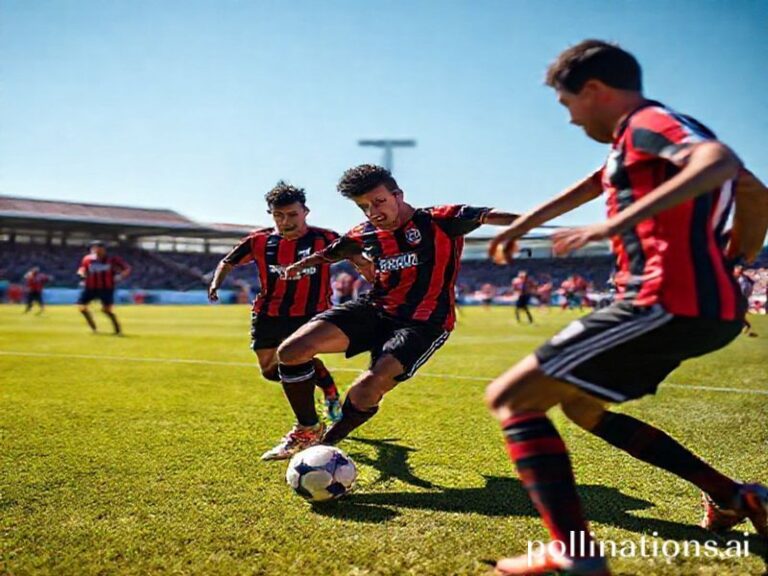Boston College vs Stanford: Global Spectacle of Guilt vs Optimism at 21 Miles Per Hour
Boston College vs Stanford: A Duel of Jesuit Guilt and Silicon Valley Optimism on the World’s Most Expensive Stage
By Our Correspondent Somewhere Over the Pacific
Let us begin with the obvious: a football game between Boston College and Stanford is not, by any sober metric, a seismic event. It will not move the Shanghai Containerized Freight Index, nor will it dent copper futures in Santiago. Yet somewhere in the cosmic spreadsheet that governs late-stage capitalism, this weekend’s transcontinental collision still merits a line item—because two brands of elite American self-loathing are about to run into each other at 21 miles per hour wearing helmets.
Boston College, that brick-and-ivy confession booth on Commonwealth Avenue, exports a very specific product to the world: guilt-edged competence. Its alumni populate the IMF, the Vatican’s accounting office, and every third risk-management cubicle in London where people whisper “2008” like a family curse. They are fluent in six languages, drink like the Irish, and apologize in Latin. Losing, therefore, is not merely a statistical possibility; it is a moral referendum on whether ambition itself is sinful.
Stanford, meanwhile, sits on stolen Ohlone land now valued at roughly $19 billion, a figure that rises every time a freshman patents a mood-ring for venture capitalists. Its graduates promise to “change the world,” which in practice means changing the world’s privacy settings. They speak in TED cadences, fly business class on someone else’s carbon offset, and regard defeat as a data point on the road to Series C. Losing is simply an invitation to pivot.
The global spectator is thus invited to choose a side in a proxy war between two American pathologies: Catholic guilt and techno-utopian arrogance. Should the Eagles prevail, expect a flurry of LinkedIn posts from Brussels about “resilience and tradition” accompanied by sepia photos of Doug Flutie. Should the Cardinal win, Singaporean VCs will retweet the final score with the comment “Iteration > Tradition,” then schedule a mindfulness retreat to process their joy.
Television rights for the game beam into 150 countries, mostly because ESPN International long ago realized that foreign insomniacs will watch anything involving shoulder pads and a marching band. In Lagos, the feed cuts out just as the Stanford Tree mascot gyrates—Nigerian viewers assume it is a fertility ritual, which, to be fair, is not far off. In Seoul, the broadcast competes with a K-pop comeback; the overlap audience discovers that both events feature synchronized choreography and the quiet fear of irrelevance.
For the betting houses of Macau, the spread is less interesting than the prop bet on total screen time for each school’s diversity commercial. The over/under is 47 seconds; take the over, because nothing calms a multinational audience like slow-motion footage of a Filipina chemist high-fiving a Ghanaian linebacker under a Coke banner. Somewhere in Zurich, an algorithm has already priced the reputational delta of a Stanford loss into Palantir’s Monday share price; the model is 78% accurate, or as accurate as anything gets in a world running on vibes.
And what of the players themselves? They are, of course, unpaid interns in a billion-dollar industry that claims to be about education. The Boston College linebacker majoring in theology has calculated that his concussion risk is still lower than the moral hazard of working at Goldman Sachs. The Stanford wide receiver signed an NIL deal with a cryptocurrency exchange whose founder is currently “on sabbatical” in Montenegro; his avatar, however, is still making 3% on every virtual touchdown.
By the fourth quarter, the scoreboard is irrelevant. The real contest is which school’s brand of existential dread travels better in a globalized marketplace of curated despair. Boston College offers the old-world comfort of knowing you will never be good enough. Stanford counters with the new-world promise that you can always be better—provided you can secure seed funding.
Final whistle. Alumni in Rome and Palo Alto exhale in mutual relief: their identities intact, their anxieties profitably exported. The rest of the planet changes the channel, vaguely aware it has witnessed not a sporting event but an infomercial for two competing flavors of American exceptionalism—both best served lukewarm, with a side of fries and a creeping sense of complicity.







